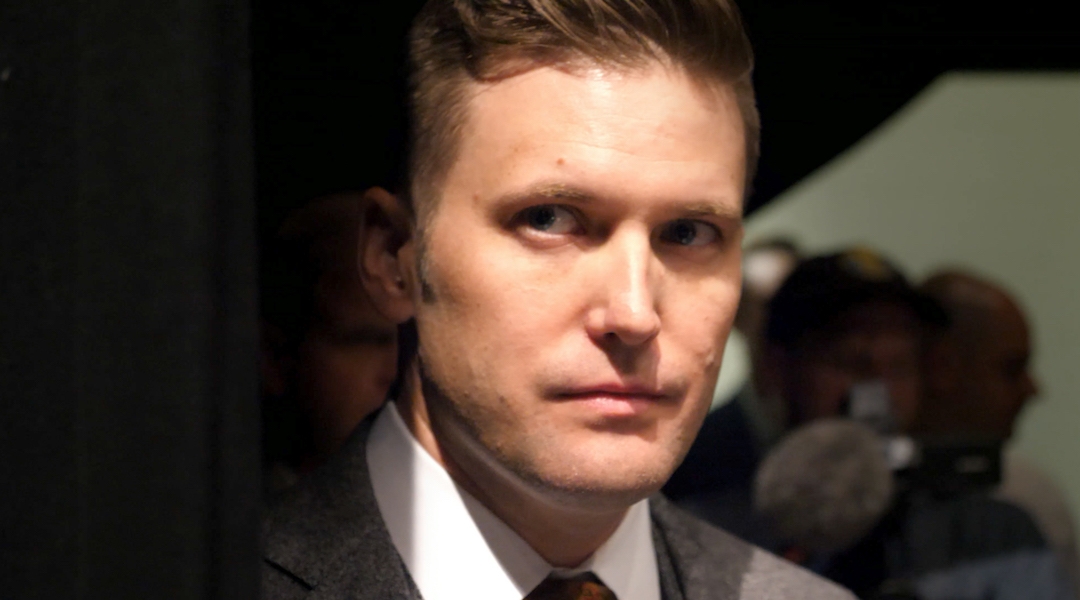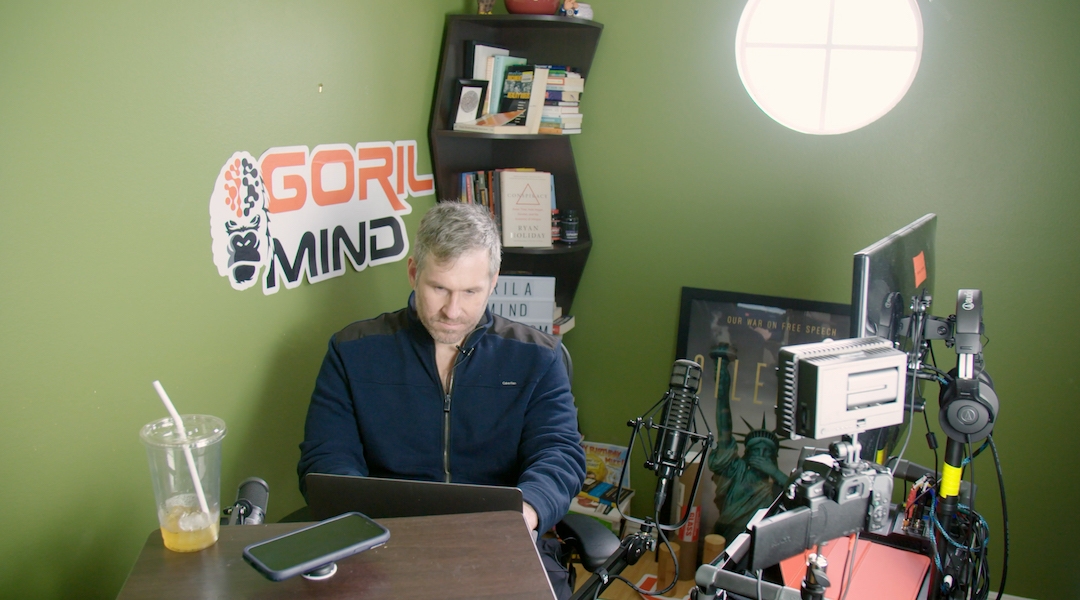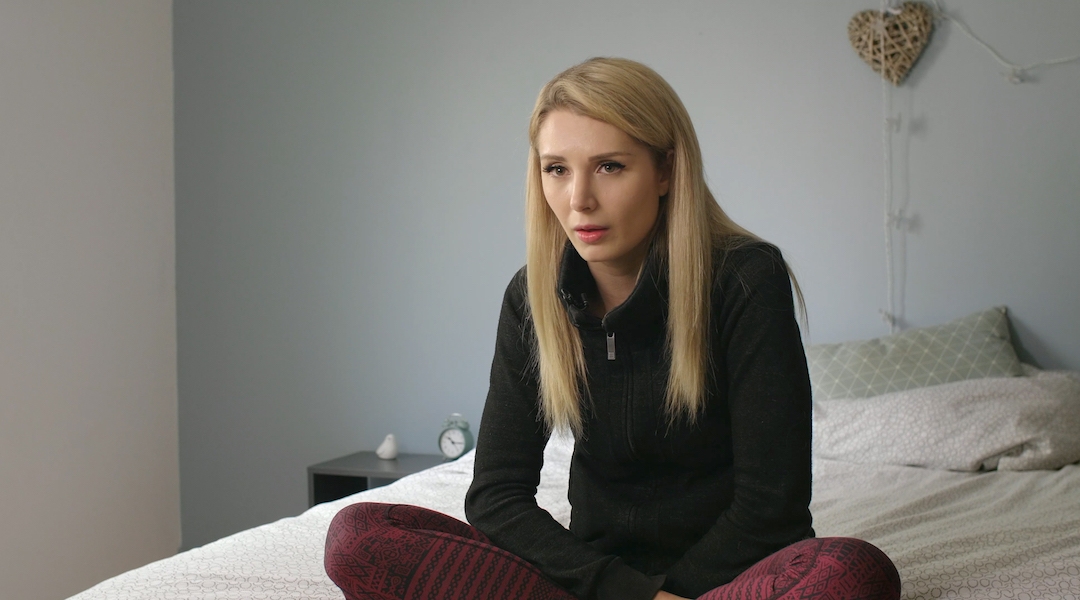The Jewish filmmaker behind ‘White Noise,’ a new documentary on the alt-right, wants to expose the movement’s hypocrisy
Published November 2, 2020
(JTA) — Soon after Donald Trump’s surprise election win in 2016, raw footage emerged of a rally where white supremacist Richard Spencer called out “Hail Trump! Hail our people! Hail victory!” and was greeted with Nazi salutes.
The filmmaker who caught that scene on tape was Daniel Lombroso, a descendant of Holocaust survivors whose grandmother cautioned him against putting himself in proximity to anti-Semites.
Over the next four years, which were punctuated with the bloodshed of far-right attacks in Charlottesville, Pittsburgh, El Paso and elsewhere, Lombroso kept his cameras rolling. He zoomed in on the movement that inspired those attacks: the alt-right, an emerging group of white nationalists like Spencer who wanted to remake the right wing and the country.
ADVERTISEMENT
Now, on the eve of an election that to some is a referendum on the far right’s influence on American society, the Atlantic has released Lombroso’s documentary, “White Noise.” It follows three of the most prominent alt-right figures — Spencer, Mike Cernovich and Lauren Southern — through the first three years of the Trump administration, as their careers ascend and then fade. Spencer was a leading ideologue and spokesman for white nationalism. Cernovich was a vocal misogynist and conspiracy theorist. Southern was a far-right antifeminist and anti-immigrant activist.
Unlike other documentaries on politics and social movements, this one is not interspersed with expert interviews, historical interludes or maps and charts. It is almost entirely composed of intimate interviews with and footage of the three figures and their fellow travelers.
The Jewish Telegraphic Agency spoke with Lombroso about what he learned from three years filming white nationalists, why he opted against interviews with experts and the anti-Semitism he faced while making the movie. This interview has been edited for length and clarity.
JTA: What drew you to this topic? What made you want to spend three years filming the far right?
ADVERTISEMENT
Daniel Lombroso: I started covering the alt-right as a reporter at the Atlantic in 2016. In November 2016, a week after Trump’s election, I caught a room full of people breaking out into Nazi salutes. It was this really pivotal viral moment four years ago because it really solidified that the alt-right is fundamentally a racist movement. It’s fundamentally an anti-Semitic movement. It wasn’t a cool, conservative rebrand like they claimed. It was racist to the bone.
I think I wanted to understand what made the ideology — which is basically white nationalism, anti-Semitism — so appealing to so many people. That’s the thing that comes across in the film, the scale of these ideas and the traction they have. I just found a tremendous amount of energy behind these ideas.
I wanted to get to the core of the ideology and understand at a more psychological level: What do these people believe? How do they work? There’s been a lot of great reporting on the alt-right and on the far right but a lot of it is from the outside looking in. The mission was to really expose who they are and what they believe. Over the course of the film you come to see how empty they are, how narcissistic they are, how vacuous the whole ideology is in the end.

Richard Spencer, the white supremacist ideologue, is one of the documentary’s main subjects. (Courtesy of Lombroso)
What was striking about this film is that it doesn’t bring in outside voices or provide much historical background for the alt-right’s claims. It’s an hour and a half of footage of them and interviews with them. Why did you choose to make the movie that way?
The best and most effective way to dismantle their ideology is to really expose the contradictions at the core of their worldview. So Mike [Cernovich] tweets things like “diversity is a code word for white genocide:” and then you see he has a Persian spouse and a biracial kid who speaks Farsi.
Ultimately that unvarnished approach, it has to be done really responsibly. It shouldn’t glamorize them. It shouldn’t make them look like rock stars. Every single day, I promise you, for four years, that was on my mind — to take them seriously. If done responsibly, that’s the most clarifying approach you can take.
A potential criticism, of course, is that we’re helping them recruit, that it’s a platform. I think it’s actually the opposite. No one comes out of the film wanting to join that movement. The three subjects despise the film and want nothing to do with it.
Even though their careers may go nowhere, the movie makes clear that they each had huge followings. A lot of people are attracted to this ideology. Are you worried that the movie lets them preach their ideology from beginning to end, and that, even if they personally don’t come out looking good, their hateful ideas are given a lot of space?
Sunlight is the best disinfectant and evil really festers in the darkness. I know that’s a cliche, and it can be handled very poorly, with a soft-glow rockstar profile, which we really wanted to avoid. This film is all about raising awareness. I think people do not understand the extent of white nationalism, of anti-Semitism, of racism in modern society.
When we screen this film for regular audiences, they’re just completely astounded to see the level of traction these ideas have in New York, LA, Paris. These are all liberal, upper-middle class spaces and they have traction among highly educated upper-middle class people.
I hope the film will be a really clear historical record of what Trump unleashed in his tenure. These people were living under a rock and now they feel emboldened, and they’re slowly but surely making their way into the mainstream of the conservative movement.
But that assumes people know that being a white nationalist is bad. Readers of the Atlantic probably know that, but a lot of people may not. It’s obviously untrue, for example, that Democrats are running a satanic, pedophilic cult, but millions of people believe that now. Did you ever feel like you needed to give more context to what your subjects were saying?
I think the film does give context in its own way, through montage, through setting things up. I think there is a want sometimes to be more heavy-handed, to bring in expert interviews, but then you’re talking about a very different film.
What this film does is give you proximity to evil, and show the banality of it and how it works. I think there is a very clear moral compass to the movie. What it does is dismantle them, dismantle their ideology. I understand the tendency to want to place judgment on where they’re coming from and I think the film does do that very clearly in its own subtle way.
I think when someone is saying “lugenpresse” [a Nazi term that means the “lying press”] and talking about extermination, that’s self-evidently bad enough to the 90% of us who care that it’s worth raising the awareness.
I really strongly doubt, in all of the focus groups, all of the people I’ve spoken to, that anyone comes out of this film feeling empowered or emboldened or wanting to gravitate toward these ideas, because they really expose themselves as being so empty.

Mike Cernovich, a conspiracy theorist, works at his laptop in the documentary. (Courtesy of Lombroso)
What kinds of choices did you make in the filming to avoid portraying them positively?
Mike Cernovich made a feature-length film called “Hoax.” He really wanted to rebrand as this big rockstar movie producer. We cut those scenes because it would have been a mischaracterization. It would have made him look cool.
We had really intense conversations about all of the shots. One example is you see Lauren [Southern] really traumatized by sexual harassment, dealing with a lot of nonsense from men on the right, and it traumatizes her and she opens up for the first time in the film about that. The most we were willing to afford her, even in that moment, was one shot looking out from the balcony.
How did you deal emotionally with being immersed in these people’s world?
It was very hard. I think I suppressed a lot. I mostly work alone. I shot everything. I ran sound. Most of the time I was alone in these environments. In a way, that helped me, both in terms of access, because they knew me they didn’t have to deal with a crew, but also emotionally. I just had too much to think about: Getting the shot right, getting the sound right, but now, in the year and a half since I’ve wrapped, going through all the footage, making sense of what I’ve been through, has been pretty hard and pretty traumatic.
I would say it’s made me much more proudly Jewish. I’m much more aware and vocal about the level of anti-Semitism in American society and obviously in European society. It’s had an interesting effect on my political views and my psychology and identity after the making of the film, just encountering so much hate. And a lot of it was directed at me, both in the physical space, but now every day I’m getting really gross anti-Semitic hate mail and Twitter DMs filled with the most disgusting Nazi cartoons.
How much anti-Semitism did you face while filming?
All of them are using dog whistles, like the Rothschilds and “global cabal” and “new world order” and Soros, and all that stuff is just so part of the vernacular. But there were also some pretty aggressive anti-Semitic incidents. I was left on a ranch in Florida in pitch black with a bunch of Richard Spencer’s followers. He’s preparing for a speech at the University of Florida and there’s all these kids dressed in white at a ranch, and Richard Spencer went out to dinner and left me with all of them, and they had just discovered recently that I was Jewish. It turned south pretty quickly. A lot of “kike”s and Hitler salutes and just really gross stuff.
[There was] a lot of really aggressive taunting for being a reporter, that you’re fake news, you’re starting a race war. Even when they talk about journalism, it’s always imbued with Jewish stereotypes. One girl got pretty drunk at an event and was trying to flirt with me once, an alt-right girl, and said, “I really love Jewish things, like journalism.”

Lauren Southern, a far-right YouTuber, discusses harassment she has experienced in the documentary. (Courtesy of Lombroso)
Was there anything you liked about your subjects as people, and how did you deal with that?
I think “liked” would be too strong a word. Even “humanity” is too strong, but you see the everydayness in them. They’re animated by a lot of the same things, obviously, that we are. I don’t mean to overstate this but they want to find some sense of purpose in life. They’re asking larger existential questions. They’re dealing with the kind of meaninglessness of modern life that everyone is dealing with in some ways. The problem is that they fill that meaninglessness with the most vile ideas possible.
We ate together and traveled together and did everything, and I came to know everything about them. And I think that is a big subtext in the film, just the banality of evil, that normal people are capable of tremendous evil.
That’s sort of the point. Mike [Cernovich] can be very personable. People in Mike Cernovich’s world really look up to him. They see him almost as sort of a father figure. That sort of thing comes across when you’re with him. He can be personable. He’s able to relate to you but he also believes in the most vile things.
What do you think journalists get wrong when they report on the far right?
I think they’re missing just how seductive these ideas are. They’re just very powerful messages and their ideas resonate to thousands of people. If you’re a young kid who’s lost or alone, living in your mom’s basement, or even if you’re a frat boy who just doesn’t know what he wants to do, on YouTube, by following these people, you can find a sense of purpose and feel like you’re becoming part of some larger.
Obviously it’s all bullshit, and a white ethnostate and whiteness is just a completely ideologically incoherent thought for a million reasons, but it really fills this emptiness that I think a lot of people are feeling. I think we have to reckon with that.
Support for Trump is a major throughline in the movie. How much do you connect Trump with what you saw?
There’s no alt-right without Trump and I actually believe that there’s no Trump without the alt-right. The alt-right as it appears in the movie is essentially dead. [But] the far-right anti-Semitic racist movement, that’s Trump’s most passionate base.
They’re also shaping his messages. All of them are warning about a migrant invasion and then you hear it on Fox and then you hear Trump yelling about invaders and invasion, and then you see a white nationalist go kill a bunch of people in El Paso and at a synagogue in Pittsburgh and also in New Zealand.
Your grandmother, who is still living, is a Holocaust survivor. What did she think of the movie?
She right away gravitated toward the opportunism, and she just said right away, “These guys are just frauds and snake oil salesmen.” She, at the top of the project, told me not to do it. She didn’t want me to be subjected to all the abuse that I’ve dealt with. She’s been very supportive and it’s been her view that people need to know what’s going on.
What lesson did you take away from the film?
I think, how much work is left to be done in this country. It’s insane to look back at articles in 2008, when Obama won, and everyone was talking about a post-racial America. It’s so clear to me, being on the front lines reporting this, how severe the white retrenchment is, how resentful parts of white America are. Even if Trump loses, it doesn’t mean that it goes anywhere. It’s still just a huge base that’s looking for the next guy. I think we’re going to be dealing with the consequences of this for a long time.















